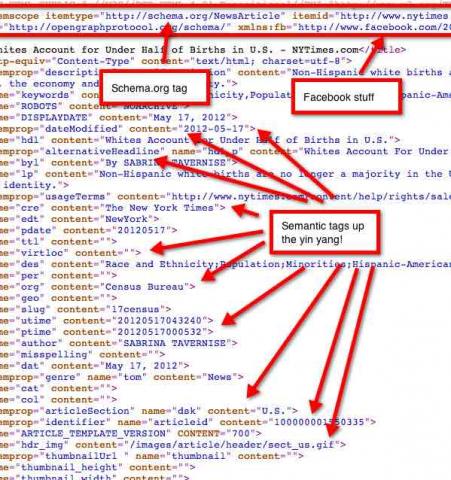
Organic search ranking is important for treatment centers and providers of all types and sizes. Website SEO can take tremendous time, effort, and expense. Soon, Google and others will begin considering a website's use of semantic markup and Accelerated Mobile Pages (AMP) pages as part of what it uses to display search results. Some reporting states that Google will not be using semantic markup or AMP to change its search rankings. But this may change in the future. The move to semantic markup and AMP is primarily intended to improve user experience. Semantic markup will help search engines and other websites "understand" the information on web pages. AMP will make mobile use faster and more streamlined. It's likely that many websites will soon begin to integrate these features and new sites should build them in by default. If you're not currently using semantic markup and AMP, now is the time to start planning.
Information on the web is readable by humans, but the machines that store, process, and deliver the information do not understand the documents they handle. They can identify text and images but do not know what they represent. Search engines can index enormous amounts of data but cannot assign meaning to them. Take, for example, an event listed on a website. To a search engine, this appears to be nothing more than a string of letters and numbers. Heading tags allow it to assign weight to different parts of the page, but it still does not know what it is reading.
Semantic data is intended to change that. Semantic markup allows web pages to describe their content to search engines. Vastly different than the keywords that were so abused in SEO in the early days of the web, semantic markup tags information on the page in a way that allows search engines to understand it. For instance, the event mentioned above could be marked in a way that indicated the boundaries of the text pertaining to the event. Within that block, properties can indicate which parts represent the title, the date, the start time, the end time, the location, the cost, and how to buy tickets, plus a host of other information as needed.
Your company’s site needs to be using semantic markup. A variety of search engines—Google being the most prominent with 90% of the search market under its massive umbrella—have announced their intention to use semantic data in their search algorithms. Companies that use structured data will see their sites showing up in more targeted searches and have greater control over the presentation of their sites on the results page. In addition, some new technologies, including Google’s AMP, require semantic markup.
To implement structured data, an accepted vocabulary for web markup is needed to indicate the meaning of various objects. One vocabulary is Schema.org, a project co-sponsored by Google, Microsoft, Yahoo, and Yandex. Although it already contains a rich set of terms and properties for describing entities on the web, the vocabulary is continuing to develop with input from web developers.
Kevin A. Wilson, PhD, of Psynchronous Communications is a participant in the W3C community group that is developing the Schema.org vocabulary. Kevin is working to define classes and properties that can be used to indicate the types of programs and services that different addiction treatment centers provide. With this expanded vocabulary, we will be able to structure our clients’ web pages so that search engines can better understand them.
